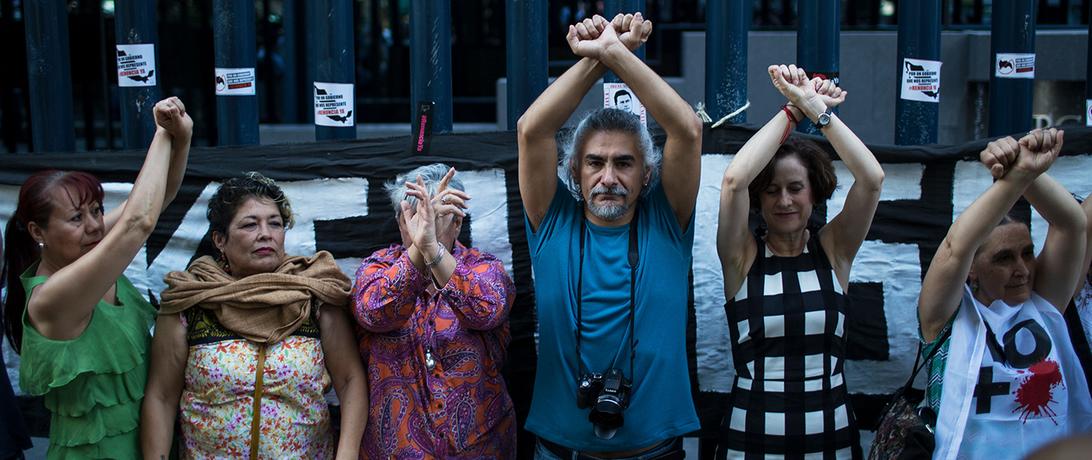
Governing fairly is an essential element in creating peaceful societies. That’s what David Cortright, Conor Seyle, and Kristin Wall argue in their new book Governance for Peace. In peaceful societies, people rely on governance institutions to solve conflicts—they do not take up arms to fight their cause. Where people feel that government is just and where their voices are heard, they are less likely to rebel. But where governments are corrupt, or perceived as corrupt, the prospects for peace diminish.
Governing fairly is an essential element in creating peaceful societies. That’s what David Cortright, Conor Seyle, and Kristin Wall argue in their new book Governance for Peace. In peaceful societies, people rely on governance institutions to solve conflicts—they do not take up arms to fight their cause. Where people feel that government is just and where their voices are heard, they are less likely to rebel. But where governments are corrupt, or perceived as corrupt, the prospects for peace diminish.
The authors devote an entire chapter to corruption and its corrosive effects on society. They write:
Corruption is fundamentally about inequality and the abuse of power, a process for maintaining privilege for some and marginalization for others. It exists …where elites cling to privileges for themselves and their clients, and at the lowest rungs of public bureaucracy, where underpaid officials demand bribes to perform basic services that should be freely available to all.
While most countries experience at least some corruption, the level varies greatly. The forms differ as well. In some countries, corruption is a tool for leaders to enrich themselves, and in others it’s a general approach used by society to make decisions. In some countries, though, it takes particularly problematic forms. Plata o plomo is a term for a type of corruption that emerged with the illegal drug trade in Latin America. Criminal gangs present politicians and civil servants with a choice—plata o plomo. “Silver or lead.” In other words, “work with us and we’ll reward you. Work against us and we may kill you.”
The effects of plata o plomo have been devastating. Government officials, who in theory are fighting a war on drugs, are sometimes complicit in the drug trade. However, the opposite is also true. In Mexico thousands of “top federal officials, generals and soldiers of all ranks, governors, mayors, judges, correction officers, and police officers” have been killed for refusing to collaborate with drug cartels. In some regions, it is well known that cooperation with illicit activity will be part of the job of civil servants. Conor Seyle asks,
“When people truly know that taking a position in government means either being corrupt or in danger, what happens? Few people will take that deal other than those willing to be corrupt, or those who don’t realize the risk. Other than the rare truly heroic person standing up, this means that the trend in governance is towards corruption and incompetence. The result is a collapse in faith in the government to be able to act effectively.”
The war on drugs in Mexico has taken the lives of more than 100,000 people since it began in 2006. Another 32,000 have disappeared. According to David Shirk, the director of the Justice in Mexico program at the University of San Diego,
“the drug cartels exploited Mexico’s entrenched politics to create ‘a system-wide network of corruption that ensured distribution rights, market access, and even official government protection for drug traffickers in exchange for lucrative bribes,’”
In 2016, 600,000 Mexican citizens signed a petition calling for the end of corruption. Mexicans regarded corruption as the most serious problem they faced and united to demand action to end it. President Enrique Peña Nieto responded by creating an anti-corruption commission that was even incorporated in the Mexican constitution. It was a potential turning point in the history of Mexico. However, one year on, the leaders of the movement say not much has been accomplished. In fact, they argue that the government has stymied their efforts at every turn.
Whether the government truly has the stomach to end corruption is unclear. What is clear is that the road to ending corruption in Mexico, like in many places today, is fraught and uncertain. It demands sustained efforts and brave people to demand change.
As Cortright, Seyle, and Wall explain, the key ingredient for peaceful societies is good governance. And good governance makes little room for corruption. Good governance is fair. It does not promote one group while discriminating against another. It upholds the rule of law for all over the short-term interests of some. For those working for a more peaceful world, tackling corruption might be the best place to start.
Article Details
Published
Topic
Program
Content Type
Opinion & Insights